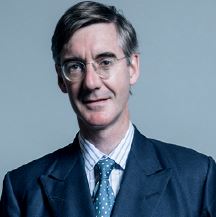Jacob Rees-Mogg
 Tipped as the conservatives’ answer to Jeremy Corbyn, the aristocratic Jacob Rees-Mogg (48) suddenly appears as one of a dwindling field of contenders for Prime Minister Theresa May’s job. Whilst Mrs May has no intention to step down, her inconsistent performance and near-constant flip-flopping is likely to prove politically fatal before long.
Tipped as the conservatives’ answer to Jeremy Corbyn, the aristocratic Jacob Rees-Mogg (48) suddenly appears as one of a dwindling field of contenders for Prime Minister Theresa May’s job. Whilst Mrs May has no intention to step down, her inconsistent performance and near-constant flip-flopping is likely to prove politically fatal before long.
It is quite difficult not to like Jacob Rees-Mogg. The perfect embodiment of all things quintessentially British, unfailingly polite and polished, it goes without saying that Mr Rees-Mogg would rather not see the UK continue its membership of the European Union. Now living his “moggmentum”, Mr Rees-Moggis not seen to covet – much less chase – a position of power, proclaiming satisfaction in his role as Tory backbencher. Though his chances of succeeding Prime Minister May are considered slim – for now – he is touted as the Tory’s secret weapon: the man who may yet be able to apply both style and backbone to the UK government as it tries to secure a moderately advantageous Brexit deal in Brussels – a gentleman’s agreement.
Mr Rees-Mogg, the delightfully eccentric son of an editor of The Times, first entered the politics in the 1997 general election, trying – and failing – to secure the Central Fyfe constituency in Scotland – a seat traditionally held by Labour. He experienced some difficulty in deciphering the heavy local accent, was criticised for taking his nanny along whilst canvassing, and ridiculed for touring the area in a Bentley – a claim he denied, helpfully pointing out that it had been a Mercedes. Mr Rees-Mogg received barely 9% of the vote, ending in third place. Reflecting on the defeat, he concluded, dryly, that “whatever I happened to be speaking about, the number of voters in my favour dropped as soon as I opened my mouth.” His peerless command of the King’s English didn’t help.
Succumbing to the charming Tory predilection for the employ of obscure words in public discourse, Mr Rees-Mogg in 2012 stunned fellow members of parliament with “floccinaucinihilipilification”* (the act or habit of describing or regarding something as unimportant) during a speech in the House of Commons on the alleged conflicts of interests at the European Court of Justice (ECJ).
Though the accusation was grave, its presentation proved priceless, instantly deflating any anger Europhiles may have experienced. The tongue twister, pronounced impeccably on the first try, earned Mr Rees-Mogg a place of note in the latest edition of Hansard, the official transcript of parliamentary debates for the longest word – at 29 letters – used during the legislative proceedings.
Whilst not given to social media, Rees-Mogg supporters have set up a number of accounts to create a certain momentum – taking a cue from the expertly run internet campaign that recently propelled Labour’s Jeremy Corbyn to unexpected heights. A devout Catholic and opposed to abortion under any and all circumstances, Mr Rees-Mogg may, at first glance, appear the most unlikely of politicians to reconnect the Conservative Party to the young voters it lost with Brexit, ballooning tuition fees, and a host of other policies that accentuate and widen the generational divide.
Yet, his oddness and unwillingness to compromise on his many convictions carry a surprising appeal. “Moggism” includes a disapproval of same-sex marriages, support for zero-hours contracts, and a disinterest in climate change. Mr Rees-Mogg is also less than excited about immigration and would much like to see the Human Rights Act repealed.
Coming from any other politician, ideas such as these might easily be discarded as inconsequential, if not retrograde. Not so with Mr Rees-Mogg who wears them with considerable aplomb and – more importantly – a keen sense for the understated. Refreshingly old-fashioned, Mr Rees-Mogg is no longer the odd man out of a political landscape inhabited by mediocrity and assorted grey mice.
* Floccinaucinihilipilification: Floccus (a wisp) + naucum (a trifle) + nihilum (nothing) + pilus (a hair) + English – fication.
You may have an interest in also reading…
Alisher Usmanov: A Likeable Oligarch
Billionaire Alisher Usmanov is a Russian oligarch with a twist. Mostly known for his thirty percent stake in Arsenal FC,
Now Even More Powerful: Our Hero Helen Clark
Helen Clark, born in 1950, served as New Zealand’s prime minister from 1999 to 2008. She was the first woman
Pope Francis: Repairing the Roman Catholic Church
Is he merely a window dresser or could he actually be the great reformer most Roman Catholics have been patiently
















































































